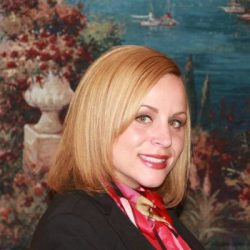This content was published: May 9, 2016. Phone numbers, email addresses, and other information may have changed.
Rhianna Johnson finds educational path and career at Cascade Campus
Photos and story by Abe Proctor
Rhianna Johnson has come full circle. The new director of Instructional Support Programs at Portland Community College’s Cascade Campus is not only in charge of some of the campus’ most important student support programs, she’s also a graduate.
In her new position, Johnson oversees a number of programs designed to help students succeed and keep them enrolled as they work toward completing a PCC degree or certificate. These include the Margaret Carter Skill Center, which helps members of traditionally underrepresented populations transition to the workforce or to mainstream college studies; the Computer Literacy Initiative, which teaches basic computer skills; the Cascade Writing Center, which helps students develop their skills with the written word; and the Cascade Student Learning Center, where students can connect with tutors, faculty members, and study groups for support and guidance.
A North Portland native, Johnson is a product of Ockley Green Middle School and Roosevelt High School. Like all too many young people, she left high school before graduating, and spent some time studying at an alternative school. When she realized it was time for a change, she enrolled in the PIVOT Job Corps Program, which then had a relationship with PCC.
Johnson finished her course of studies with PIVOT, and earned her GED at the college’s Skill Center while she was at it, through a partnership program. Again, just as she had after leaving high school, she found herself at a crossroads.
“I had my GED – ‘Now what?’ ” she recalled asking herself. “I didn’t want to be a secretary; I knew I wanted something more.
“I wanted to be a U.S. Senator!” she lauged.
Advisors with Job Corps and at Cascade campus helped her get on a path to a degree. She enrolled in core credit classes at Cascade, and became the first person in her family to go to college. Suddenly, she found her world growing bigger by the day.
“It really changed my life,” she said of her decision to continue her studies. “I found out I didn’t know anything about anything.”
Many of the instructors she encountered while at Cascade are still around today, she said, a fact that makes her new job all the more enjoyable. She took a history course from James Harrison and she said, “He is a brilliant teacher; he really opened my eyes.” Also, Johnson took a Spanish course from Jan Underwood, philosophy with Shirley Geiger, and a writing course from Michael Dembrow, who is now a member of the Oregon Senate.
“I would tell him my ideas, and he would really listen,” she said of State Sen. Dembrow. “That was a big deal to me at that time in my life.”
Despite having started a family while going to school, Johnson was in love with education and would not be deterred. She quit her job as a truck stop waitress and transferred to Washington State University in Vancouver, Wash., where she would earn a bachelor’s degree in Public Affairs. All while taking classes two days a week while raising her son. She got her start working in higher education around this time, serving as an advisor at Clark Community College in Vancouver. Like those who had helped her continue her education, she wanted to make a difference with other “non-traditional” students and help them realize that they could overcome obstacles and find success.
She followed this up with a master’s degree in Sociology from Portland State University, focusing on the sociology of education, and began seriously contemplating a career in education.
“I learned that it was a little more difficult to become a U.S. Senator than I had thought,” she reflected.
She taught as an adjunct sociology instructor at Clark College, and worked part-time as an advisor for several of Clark’s career/technical educational programs, something that has served her well in her new role at Cascade. Eventually, she took over Clark’s educational programs at the Larch Correctional Center in Washington state.
“It had its pros and cons,” she said of her time in correctional education. “I loved working with the students; I loved helping them to see education as a way to transform their lives. But it was a really remote location, and I found myself wanting to be back in a vibrant, urban environment.”
An environment, it turns out, very much like North Portland and Cascade Campus, where her journey began.
Johnson has big plans for the programs she oversees, and is especially excited about growing the Margaret Carter Skill Center into the area’s principal resource for underrepresented and marginalized populations to turn their lives around. She is specifically interested in creating a prison-to-college pathway for formerly incarcerated individuals and hopes to reach out to that population through the Skill Center.
“I want to see it thrive,” she said of the Skill Center. “It plays such an important role in supporting people who are starting out or transitioning. It’s a pathway to college and career.”Most of all, Johnson is happy to be back in the neighborhood where she grew up, at the campus where she first realized her own potential and learned what she needed to do to reach it.
“I’ve always loved Cascade,” she said. “I came from here.”
